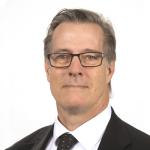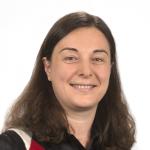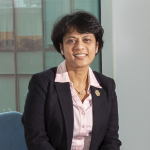Isenberg Faculty Among World’s Top 2% Most Cited Scientists
November 4, 2024
Isenberg School of Management faculty at UMass Amherst are among the most prestigious researchers in the world, according to Stanford University’s Top 2% Scientists List, published in September. The annual list identifies researchers worldwide who are among the most-cited scientists in their respective fields.
“I am pleased to see several Isenberg researchers listed as the top 2% cited scientists in their fields,” said George Milne, PhD, associate dean of research and PhD programs, one of the nine faculty members included on Stanford’s list. “Citations are one metric that measures the impact of our scholarship, and this is a testament to the thought leadership in Isenberg.”
Read more about each of the researchers:

Albert G. Assaf, PhD is the Hadelman Family Faculty Fellow and professor of hospitality and tourism management. His research focuses on performance modeling within the tourism and hospitality industry. His work has been agenda-setting, rigorous, and highly relevant, with significant impacts on both research and practice. Assaf is known for introducing cutting-edge empirical methodologies to answer complex questions such as performance measurement and creating efficiency in hospitality strategies and decision making. His contributions have enhanced the ability of tourism policymakers to make more informed decisions.

Melissa Baker, PhD is the Jaime ’76 and Cindy Pereira Faculty Fellow and chair of the Hospitality and Tourism Management Department. Her research focuses on customer experience management. Her first main stream of research examines service failures and recoveries, including how difficult customers affect employee wellbeing, mental health, and performance as well as how customers affect one another in the shared service environment. Baker’s second main stream of research examines appearance and impression formation. This includes how elements of customer and employee aesthetics and appearance affect customer perceptions and behaviors in their service experiences.

George Milne, PhD is associate dean of research and PhD programs and the Edward D. Shirley ’78 Endowed Professor of Marketing. Much of his research has focused on consumer behavior, enhancing consumer well-being, information technologies used by marketers, and public policy topics. He continues to conduct research about privacy issues pertaining to brand privacy reputation, and marketers’ strategies for managing consumer data collection. Another stream of research he’s now focusing on is Mindful Consumer Behavior and Mindful Marketing, where he’s investigating how mindfulness principles can be used to develop best practices for making marketplaces more ethical and sustainable.

Anna Nagurney, PhD is the Eugene M. Isenberg Chair in Integrative Studies, director of the Virtual Center for Supernetworks, and professor of operations and information management. Her research focuses on network systems, including transportation and logistics networks, with a special emphasis on perishable product supply chains from food to pharmaceuticals, along with sustainability. Anna's recent research includes the modeling and analysis of food security and food quality issues, ranging from the level of food banks and communities to that of international trade, along with policy interventions. She works on supply chain and critical infrastructure resilience and mitigating, responding to, and recovering from large-scale national and regional emergency incidents, such as hurricanes, chemical spills, terrorist activity, or pandemic diseases. Because of her research, Nagurney has been appointed to serve a five-year term as an expert on supply chains in the Science Advice and Guidance for Emergencies (SAGE) program, an Office of Enterprise Services, Administration and Support Division program , which has a direct link to the Chief Scientist Office in the U.S. Department of Homeland Security (DHS).

Irem Onder Neuhofer, PhD is an associate professor and PhD program coordinator in hospitality and tourism management. Her research focuses on topics such as blockchain, cryptocurrency, artificial intelligence (AI), and machine learning. She is interested in exploring how these technologies can transform the hospitality and tourism industries, and how AI and machine-learning models can be applied to enhance decision-making processes, improve automation, and optimize resource management.

Orlando Richard, PhD is the Earl W. Stafford Professor in Organizational Studies. His research focuses on topics such as race in organizations, diversity and inclusion practices, organizational justice, strategic human resource management, leadership, and diversity climates. One of his key focus areas is the ways in which visible and non-visible attributes of demographic diversity within organizations relate to and impact processes and performance outcomes.

Monideepa Tarafdar, PhD is the Charles J. Dockendorff Endowed Professor of Operations and Information Management and editor-in-chief of the Journal of the Association for Information Systems. Her research focuses on AI and bias, algorithmic and gig work, societal impacts of social media such as misinformation, use of generative AI applications, and technostress (stress from the use of IT). She has held appointments such as a visiting scholar at MIT Sloan CISR, a visiting professor at the London School of Economics and Political Science and the Indian Institute of Management Calcutta, and a senior research fellow at Weizenbaum Internet Institute in Berlin.

Matthew Thomson, PhD is the Charles D. Schewe Faculty Fellow and a professor of marketing. His research is focused on understanding how consumers and managers think about brands, publishing papers with collaborators on topics such as consumer-brand relationships, celebrity branding, brand extensions, companies’ use of brand nicknames, and consumer perceptions of brand authenticity. His projects probe how AI can help managers more effectively respond to brand transgressions and understanding what kinds of consumer relationships are most effective at driving long-term brand loyalty.

Muzzo Uysal, PhD is the Carney Family Endowed Professor of Hospitality and Tourism Management. His research focuses on the field of quality of life and wellbeing. This evolving research stream aims to understand the socioeconomic impacts of tourism activities on the wellbeing of various stakeholders within the tourism and hospitality ecosystem. The outcomes of this research guide policymakers in designing, managing, and monitoring tourism activities and development to enhance overall wellbeing while protecting resources through sustainable business practices. He feels that the most exciting aspect of this research is its societal implications, particularly in shaping policies that support sustainability and individual wellbeing, whether one is involved in the production and consumption of tourism and hospitality goods and services.
In addition to these nine current faculty, three other members of the Isenberg community were also included on the list: Charles Manz, PhD, professor emeritus; and, posthumously, the late Steven Floyd, PhD, and David Lepak, PhD.
About Stanford/Elsevier's Top 2% Scientist Rankings
The list, created by Stanford University using Scopus data provided by Elsevier through ICSR Lab, aims to provide a standardized way to recognize scientists who have made a significant impact on their respective fields. It draws from a variety of citation metrics, such as the h-index, co-authorship, and adjusted citation counts, to ensure fair and balanced representation of researchers. The list is updated annually, with career-long data and single-year impacts for transparency and current relevance.